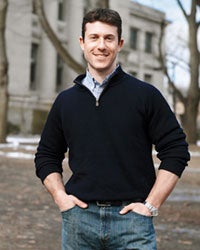Last January, Andrew Klaber ’09 was invited to Davos, Switzerland, to participate in the World Economic Forum with the world’s elite business, political and intellectual leaders. In a panel discussion about innovations in leadership, Klaber brought his message of social entrepreneurship to the world stage.
“Throughout history, the model has been to learn, earn and then return,” Klaber said. “People in our generation want to do these things simultaneously—they want to learn while they are earning and give back at the same time, because they want to feel that sense of mission.”
As an undergraduate at Yale, Klaber began trying to figure out how to balance those three goals in his own life. While spending his sophomore summer in Chiang Mai, Thailand, he was shocked by the prevalence of the sex trade. Since a young girl in Thailand can make 20 times more money as a sex worker than she can working in a rice field, poor or orphaned girls often drop out of school and become prostitutes to support family members. Worse, Klaber learned, the young girls he saw walking hand in hand on the streets with “farang,” or Westerners, had often been affected by HIV/AIDS.
Klaber decided to create a scholarship program that would subsidize the cost of sending children made vulnerable by HIV/AIDS to school. Today, that program, Orphans Against AIDS, supports 350 children in seven countries in Asia and Africa every year throughout their primary and secondary educations.
Klaber, a Chicago-area native who earned a master’s in financial economics at Oxford and is currently a joint J.D./M.B.A. candidate at Harvard, envisions a career that connects nonprofit organizations with for-profit businesses—a practice he has already begun to explore with Orphans Against AIDS. He has worked with businesses—including Pfizer, Google and Goldman Sachs—to raise the capital necessary to support his organization. And he’s partnered with Tanda Zulu to sell jewelry made by South African women who have been affected by HIV/AIDS, with all profits supporting Orphans Against AIDS.
Klaber also works with volunteers—many of whom are fellow students or others working “day jobs” in the private sector—to raise money in the U.S. and find partner organizations in Asia and Africa that work locally to identify and support affected children. He sees this model as one of the organization’s strengths, and he hopes the firsthand development experience will put his peers in a position to continue sustaining nonprofits throughout their careers.
“It’s kind of a three-pronged mission,” Klaber said. “We want to send these children to school, we want to support and build the capacity of the partners whom we work with on the ground, and third, we want to act as an incubator … for young social entrepreneurs.”
Even though Cambridge seems a world away from Chiang Mai, envisioning the faces of the children who have the opportunity to go to school for the first time is what keeps Klaber committed. “One of the beliefs I have … is people generally rise or fall to the level of expectations that you have for them. Even a 6-year-old can sense when somebody believes in her.”
